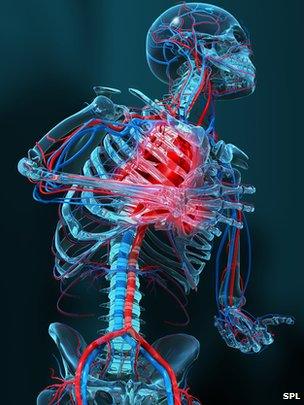NHS 'should consider giving statins to healthy people'
- Published

High cholesterol can lead to blocked blood vessels which cause heart attacks and stroke
Thousands of heart attacks and strokes could be prevented if the cholesterol-lowering drugs, statins, were more widely prescribed, research suggests.
<link> <caption>The study of 175,000 patients, in the Lancet,</caption> <url href="http://www.thelancet.com/journals/lancet/article/PIIS0140-6736(12)60367-5/fulltext" platform="highweb"/> </link> said even very low-risk patients benefited from the medication.
The Oxford researchers says the NHS should consider giving statins to healthy people. The NHS drugs watchdog, NICE, is reviewing the evidence.
However, statins have been linked to side-effects such as kidney failure.
'Unparalleled' detail
They are among the most widely prescribed drugs in the UK and have long been known to help people at high risk of heart attack and stroke.
However, there has been considerable debate over medicating healthy people - both whether it works at all and if it would be socially acceptable.
Professor Baigent, researcher: "Benefits outweigh hazards"
Researchers at the University of Oxford say they have investigated the issue in "unparalleled" detail.
Their review of 27 trials concluded that statins significantly reduced the risk of heart attack and stroke for everyone.
Current rules from NICE - the National Institute for Health and Clinical Excellence - recommend statins for people who have a 20% or greater chance of developing cardiovascular disease within 10 years.
Doctors look at a patient's age, blood pressure, cholesterol levels and lifestyle to work out the risk.
One of the researchers, Prof Colin Baigent, told the BBC: "We've been taught over the years that high cholesterol is the thing that matters; you mustn't have high cholesterol.
"But what we've actually learned is that, whatever your level of cholesterol, reducing it further is beneficial.
"Whatever your level of risk, the benefits greatly exceed any known hazard."
He calculates that lowering the threshold for prescribing statins to a 10% risk of cardiovascular disease within a decade would lead to five million more people taking the drugs.
This in turn would save 2,000 lives and prevent 10,000 heart attacks or strokes every year, he said.
Prof Baigent said: "Half of [these] deaths come out of the blue in people who were previously healthy.
"If we are going to prevent that half of cardiac or stroke deaths, then we've got to consider treating healthy people.
"It can't be done any other way."
Caution urged
He, alongside fellow researchers, is now calling on NICE to review the evidence for giving statins to more people.
NICE, which sets drugs policy for England and Wales, said it was updating its guidelines.
The organisation said: "New evidence on statin treatment thresholds that has become available since publication of the original NICE guideline, including the study reported in the Lancet, will be considered as part of our review."
Their conclusions will be published towards the end of 2013.
One of the questions will be over side-effects. Statins have been linked to liver problems, kidney failure, muscle weakness and an increased risk of diabetes.
Prof Shah Ebrahim, from the London School of Hygiene and Tropical Medicine, conducted a large review of the evidence last year.
<link> <caption>His results</caption> <url href="http://onlinelibrary.wiley.com/doi/10.1002/14651858.CD004816.pub4/abstract" platform="highweb"/> </link> urged caution, and Prof Shah said doctors should stop prescribing to healthy patients.
He now says: "This research provides further evidence that statins are an effective and safe way of reducing the risk of heart attacks and strokes even among people at quite low risk of these conditions."
He suggests that universal prescribing to the over-50s might be appropriate, as 83% of 50-year old men have a 10% risk of cardiovascular disease in the next 10 years.
"The benefits of giving statins to everyone over the age of 50 would probably save the NHS money in the long run, owing to the savings in health care costs from the heart attacks and strokes prevented."
However, he questioned whether it would be good for people or society to resort to mass medication for lifestyle issues.
- Published17 May 2012
- Published19 January 2011